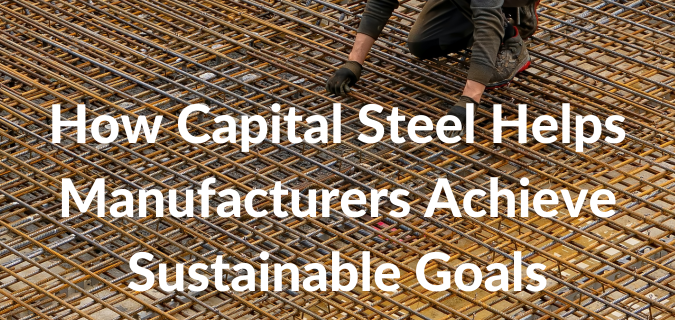
One of the beautiful aspects of steel is how sustainable it is on its own as a material. Steel is 100% recyclable and, as such, can be repurposed into new steel and reused perpetually. Your old refrigerator could become your next car. Old buildings become new buildings, radio towers become bridges, and on and on. When properly recycled, no steel is wasted.
This is all great, but the actual processes—recycling and manufacturing new steel—continue to evolve as manufacturers look to lessen their carbon footprint. Sustainable manufacturing processes are not only increasingly important for environmental reasons, but with new technologies and government incentives, green manufacturing can actually lead to a competitive advantage for those companies that embrace a commitment to sustainability.
At Capital Steel, we know sustainability in the manufacturing industry is important to you and your customers. We help source steel from sustainable manufacturers and can advise you on meeting green building requirements.
Why are Sustainable Practices Important to Manufacturing?
According to the International Renewable Energy Agency (IRENA), the steel manufacturing industry makes up approximately 7% of carbon dioxide emissions globally (steel is one of the most energy-intensive industries despite being one of the most sustainable materials). To bring those numbers down, eco-friendly manufacturers have been introducing and refining new technologies.
The biggest impact over the past half-century has been the adoption of electric arc furnaces (EAF) for steel production, which have reduced carbon emissions by 60% over blast furnaces. Other technologies like smelting reduction and blast furnaces (BF) with biofuel are also being used, with several other technologies in development and slated to be widely available in the coming years.
Sustainable development in manufacturing industries continues, with steel manufacturers, in particular, paying special attention to the environmental benefits as well as government incentives and the always-becoming-more-stringent carbon regulations and requirements. Setting sustainability goals can be as lofty as being completely carbon neutral in two or three decades or reducing greenhouse gas emissions by a certain percentage within the next 5-10 years. Companies setting these goals for themselves make them specific, attainable, and, perhaps most important, something on which they can continue building. That is, a company that reduces its emissions by 25% over the next five years can then set another goal to reduce emissions by another 25% or more over the following five years in a constant pursuit of improving environmental sustainability.
Why Steel Sustainability is Valuable
Among other attributes, steel is strong, workable, paintable, weather-resistant, affordable, and abundant. To have so many important qualities in a material that can be regularly sourced at low prices would normally be reason enough for manufacturers to choose steel, but add the complete recyclability of the material, and steel is one of the most environmentally friendly materials in existence.
An Affordable Material
Steel is so affordable because it’s abundant and sustainable. Iron makes up 35% of Earth’s mass and manufactured steel can be endlessly recycled into new steel. Green manufacturing companies know they’re already working with a green material in steel, and are often able to invest more in sustainable manufacturing processes while saving so much on materials costs.
More potential savings in the form of government incentives help companies get ahead of evolving regulations and be prepared for a more sustainable future.
Abundant Resource
Iron is the most abundant material on earth and steel is by far the most prevalent metal product . In fact, more than 90% of all metal products are steel. Working with steel comes with assurances of availability and, as American steel is considered a green construction material, sustainable manufacturers have a head start on meeting sustainability goals and can focus their efforts on sustainable manufacturing resources and processes.
Endless Possibilities
Its vast versatility is the main reason steel is used so heavily. Steel can be manufactured to handle specific functions and meet demanding conditions such as extreme heat or cold, depending on the need. Plus, all steel, when properly recycled, is 100% recyclable, repeatedly, without any quality deterioration.
Why Choose Capital Steel as your Sustainable Provider?
We know how important sustainable manufacturing processes are to you and your customers. And to us. We recently installed a Solar Array system at one of our facilities to help reduce our carbon footprint. Watch Capital Steel president and owner Kelly Preston and director of manufacturing Fred Render discuss the new Solar Array system here.
Achieve Sustainability with Capital Steel
What are your needs with manufactured steel? What are your company’s sustainability goals? We advise on green building, source steel from sustainable manufacturers, and work toward reducing the carbon footprint—yours, theirs, and ours—however we can.
To discuss exactly what we can do to help meet your goals, contact us today and we’ll be in touch.





